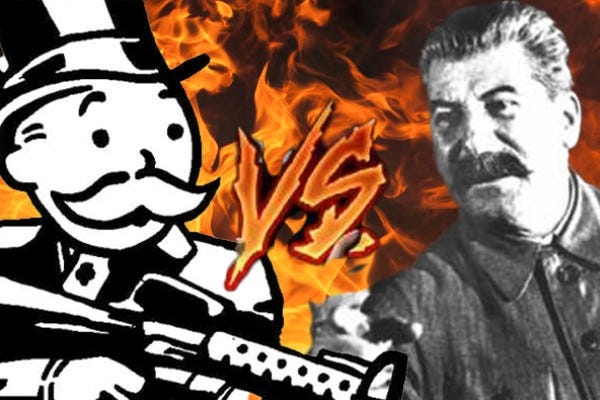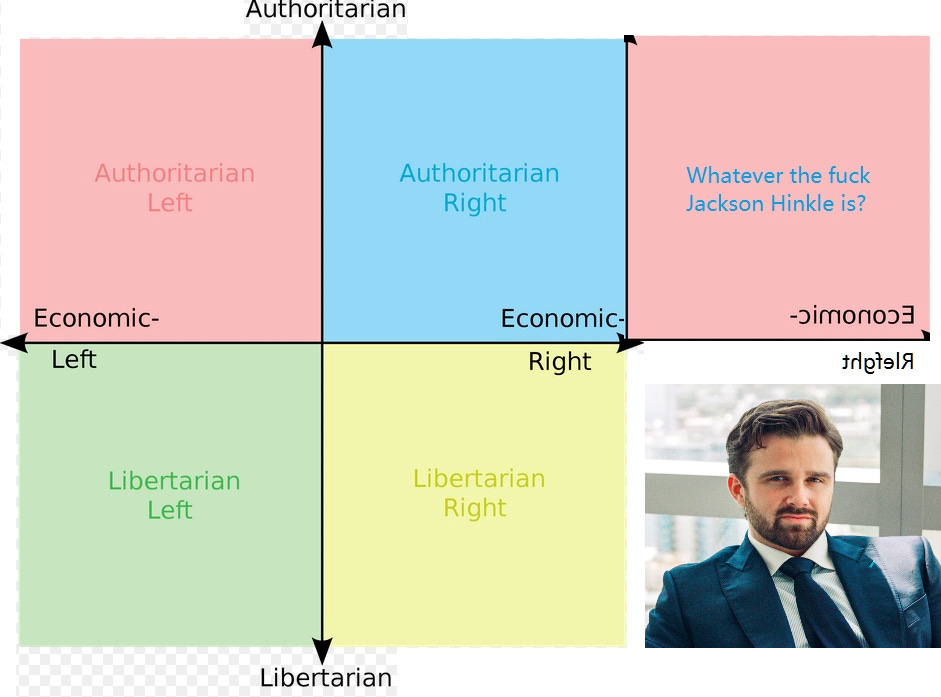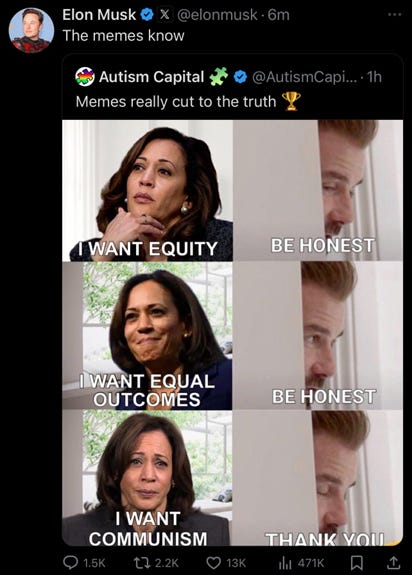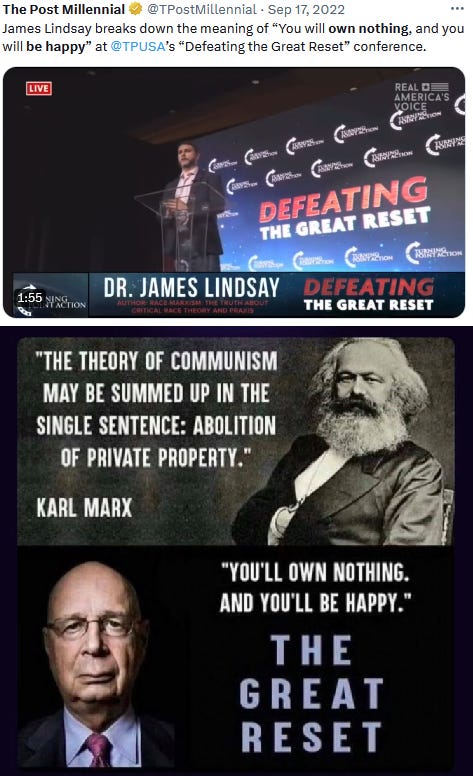Nobody Actually Understands What Capitalism or Communism Means
Every election season at any level in any western country inevitably brings us this infuriating argument
If you ever want to invoke in yourself the desire to throw your body headfirst into a threshing machine then simply wade into an internet discussion that is ostensibly about communism. Or socialism, or for that matter, capitalism. You will quickly find out that nobody knows what any of these words mean. Except maybe communists who, in my experience, usually do have a pretty good understanding of their own ideology. And I say usually, because Jackson Hinkle exists.
Particularly during the American election season you’ll see conservative politicians throwing around the “communism” libel because that old injury called Vietnam still aches sometimes and gets nationalists all agitated when you poke it. For the most part, politicians in educated countries have a decent understanding of what communism and capitalism actually are, so you know that when they accuse their opponents of communism they are always lying.
That said, America’s status as an educated country is dubious and lying implies intent to deceive so if there’s one defence I can offer for Republican officials it might be that they’re mostly just stupid? We know Donald Trump doesn’t know what communism is. We sure as hell know Elon Musk doesn’t. But they’re all pretty sure that the word alone sets people’s dark humours aflame so they keep using it as liberally as they can. Why hone the sophistry skills refined over a hundred generations when you can do the rhetorical equivalent of throwing a fistful of corn to a brood of hungry chickens?
I always get a few people upset at me in this column when I directly criticise capitalism and I’ve always found that odd because vigorously defending capitalism if you’re not a moustache-twirling cartoon character with a monocle feels to me like vigorously defending long lines at the DMV. The only thing that gets me more backlash from Substack than a critique of capitalism is when I say something in support of vaccines.
But it’s not a pushback like I’m saying something personally offensive to people so much as a defensive, corrective kind of pushback. Like I’m agitating for something deeply unpleasant, and it occurs to me that a lot of people more or less conflate the economic system of capitalism itself with “the concept of owning stuff or getting stuff” and “the freedom to do what you want with your money.” Furthermore, the absence or regulation or reform of capitalism is the encroachment of its only alternative, communism (or socialism, as they’re often conflated) which is “not owning stuff” and “being told what to do with your money.”
Capitalism, communism, and for that matter socialism and most of the isms really are actually big ol’ fuckin’ super-duper complicated systems of economics that people dedicate entire careers to studying, and these big ideas have been boiled down and simplified so much over time (and a fair bombardment of propaganda) that the layperson doesn’t even know what they are anymore.
I’m not even going to criticise capitalism in this week’s piece! Shit, I might even throw a curve ball and criticise socialism instead. I’m wild and crazy and can’t be predicted or stopped. But I do want to lay down some definitions because for all the complexity there are some basic 101 facts that you can learn in five minutes that will put you head and shoulders above your typical Turning Point USA pundit.
Probably the most fundamental thing to understand is this: In most systems, the value or reward generated by producing a product or service goes to the owner of the tools and materials used to create that product or service. In a communist system, that person is usually the person who did the work. In a capitalist system, that person is usually somebody else.
Very roughly, the idea behind people having this direct relationship with the product of their own labour in theory makes it easier for people to meet their own needs and the needs of their community, as opposed to working to enrich somebody else who in turn gives some fraction of that reward back to you that is hopefully enough to meet your basic needs or at least keep you alive enough to keep working.
Socialism is a big tent category that comes in a lot of different flavours and it’s really more of a spectrum than an ideology. They all involve some degree of the overall wealth generated by the labour of people in a society being used for the upkeep of that society and at least attempting to ensure that basic needs are met, as opposed to the strictest application of capitalism which is based entirely on the relationship between worker class and the owner class. If non-workers needs are met at all in this system then they are met only through the voluntary charity of the owner class. Basically you either work, starve, or Mr Beast visits your town.
What people get wrong about socialism is they think this means The Government, like when the government collects taxes and uses them to run the country. That’s not really using the term properly. The existence of the Fire Department isn’t socialism. There’s always going to be a government and it’s always going to Do Stuff and if that’s socialism then everything is socialism. Feudal Europe is socialism. Pirate Law is socialism. Really the important distinction involves that scary Marxist term the means of production. It’s not really a socialist concept if the tools used to make stuff aren’t owned by the people using them.
Communism is a particular system at the far end of the socialism spectrum that, if all goes to plan, wouldn’t necessarily involve any government the way we know it or money, because everyone would essentially just have what they needed (these models tend to presuppose plentiful abundance) and can just barter and bargain for anything else.
It's kind of important to understand, I think, that there aren’t any currently existing communist countries, there (arguably?) never have been any communist countries, and all the countries that we call communist countries, or who call themselves that, are just claiming communism is their long term goal. (China, for example, has set the year 2049 as merely their goal for achieving the first step toward communism.)
Now, I’m not a communist. Not because I don’t want everyone’s needs to be met, but because I don’t think it’s plausible right now. I’m in favour of working toward the end of scarcity, and if that happens, then who knows? The thing is, though, that a lot of the people who oppose communism oppose it specifically because they don’t want everyone’s needs to be met.
That would include the undeserving people. Like poors, or lazy people, or, you know, people you might not like for some … other … innate reason.
Not a lot of people are going to come out and say there’s a class of people they consider undeserving of their basic needs being unconditionally met, so they’ll lean on something like “it goes against human nature,” because people are selfish and they won’t just help each other like that. Most people will try to hoard all the stuff for themselves, so what we need is a system that incentivises people to… try to hoard all the stuff for themselves. You know, just go one hundred percent with the grain. Capitalism is what it is because we simply evolved into it.
It's just the law of the jungle, man. Oddly, since capitalism has only existed in its current form for around 200-300 years, this kind of implies that we did some sort of weird departure away from human nature for the first several thousand years of human civilization before deciding to just embrace it again in the mid-18th century when Adam Smith rediscovered it under a couch cushion.
To those who appreciate the simplicity of the every-man-for-himself system of capitalism, it’s an easy, erroneous, and hysterical shorthand to just think of any policy or law or even just a strong recommendation that helps other people in the community as being socialism or communism.
Speed limits are communism. Leash laws in dog parks are communism. Washing your hands after you take a shit is communism.
Again, this isn’t just people all being idiots. Some people are being idiots, certainly, but it comes from a very long tradition of political elites and the super rich needing some easy terms to scare people into sticking with the status quo, especially when the status quo isn’t working so well for everyone, and ever since the Soviet Union those terms have been communism, socialism, and Marxism. It’s the political equivalent of saying something is haram. It’s the Because I Said So of political rhetoric.
Any time there’s pressure on the shitty elites, the government, or the owner class by the people to make things better for society, the first thing they’ll reach for is who they can scapegoat (usually a racial minority or some underclass) and push the idea that this is their fault and the means through which they’re bringing society down is, vaguely, communism or socialism.
This means of course that everything in society, when purged of all the socialism, can be trusted to just work. People give thanks to capitalism like they’re saying Grace to their deity when things go well, but when capitalism doesn’t actually work great or even kinda screws them over, instead of realising they just got done ugly by capitalism they think they were stealth attacked by socialism in the night.
All of the photos in that meme come from capitalist countries. Being capitalist doesn’t magically make you immune to supply chain problems. Towns and public areas and hospitals falling into ruin is more often a direct result of a lack of social safety nets and public policy. And the rich politician thing is always the funniest one to me because it’s literally impossible to get elected in a capitalist country if you are not rich. The system prevents it.
Here’s Ben Shapiro explaining how, when exploitation happens in capitalism, it’s not actually capitalism but something called corporatism. That’s another word people use to dismiss unpleasant elements in what is actually capitalism working as intended. It’s either corporatism or mercantilism or rainbow capitalism, and they’ll always tell you this comes from being infected by socialism.
This is my all time favourite abuse of these misunderstandings—when they actually gaslight people into thinking these definitions are upside-down and flipped around, that the elements of socialism that sound desirable to the average person are what we’re actually living under right now, and the elements of capitalism that sound shitty are, in fact, the spooky socialist hypothetical.
Wow, imagine an economic system where someone does a job but two thirds of the generated earnings just go to the person who told them to do the job. What, you mean they get most of the cash just because they own the mop and bucket? Sounds like communism to me.
Propaganda outlets like Turning Point are great for this—just flat out taking complaints that people have about capitalism and just saying “nuh-uh, actually, that would be socialism” – without further elaborating.
I think the most baffling success that special ed rejects like massage therapist-turned-somehow-conservative influencer James Lindsay have had on this front is somehow convincing people that rent-seeking is communism.
You know, rent-seeking, the most iconically capitalist behaviour that exists. So capitalist that it’s a remnant of capitalism’s primordial form, feudalism. (You know why they’re called land-lords, right?)
And I get it, I see the confusion here and I think Marx made some shitty choices in terminology, but then again, Marx didn’t count on an idiot like James Lindsay trying to convince people that abolishing private property means they’re coming for your fucking toothbrush.
There are three types of property when you’re talking within an economic framework: Public property, private property, and personal property.
Public property is stuff that is owned by the government or the state or the commons or whatever. You know, public parks, public amenities, public services, etc.
Private property is stuff owned by a legal entity or administrative body that is not the state or the government or the commons. You know, like, a corporation.
Personal property is your toothbrush. It’s the stuff that you and your family own. Your home and everything inside of it.
What Marx wanted to abolish was that weird private entity called a corporation that existed within the state and had a corrupt relationship with the state and imposed its own shitty type of tax on the people called rent. Entities that stripped people of their right to their own home in favour of paying someone else for it, forever.
The phrase “you’ll own nothing and be happy” is actually a utopian capitalist ideal, originating, of all places, from the World Economic Forum. It’s a fascinating detail of the mindset of the capitalist elite that they will try to convince you that private ownership of things is a burden that they want to free you from, and replace it all with ongoing contracts. Don’t worry about burdening yourself with all this stuff! Just pay us for as long as you want (or are able) to use it!
Do you enjoy the fact that you pay forever for Photoshop now? Or that you subscribe to your car’s headlights and horn? That’s capitalism, baby, it ain’t Kim Jong-Un who’s going to remotely brick your television if you miss a payment.
Okay, so maybe I did criticise capitalism a bit here. But to be clear: There is no major candidate in the western world who is actually currently proposing what socialism actually is, and sure as hell not communism. If you genuinely don’t like what these systems look like, then you legitimately have nothing to worry about, because nobody is seriously bringing them. You have flavours of capitalism to choose from, just some more appetizing than others.
And don’t worry, your toothbrush subscription plan is coming soon.





















another dangerous economic myth which is repeated ad nauseam is that a government is like a household and has to 'balance its books' - which is wrong in that (1) government spending and taxation is only one part of the national economy and (2) government doesn't have control over the other parts. Also national governments (except in the EU) can create further money:
https://theconversation.com/why-the-federal-budget-is-not-like-a-household-budget-35498
https://neweconomics.org/2018/10/a-government-is-not-a-household
https://billmitchell.org/blog/?p=332
Don't we already kind of subscribe to toothbrushes? That's the ultimate aim of all of this right, to create things that don't last forever. Every company is looking for it's added value.